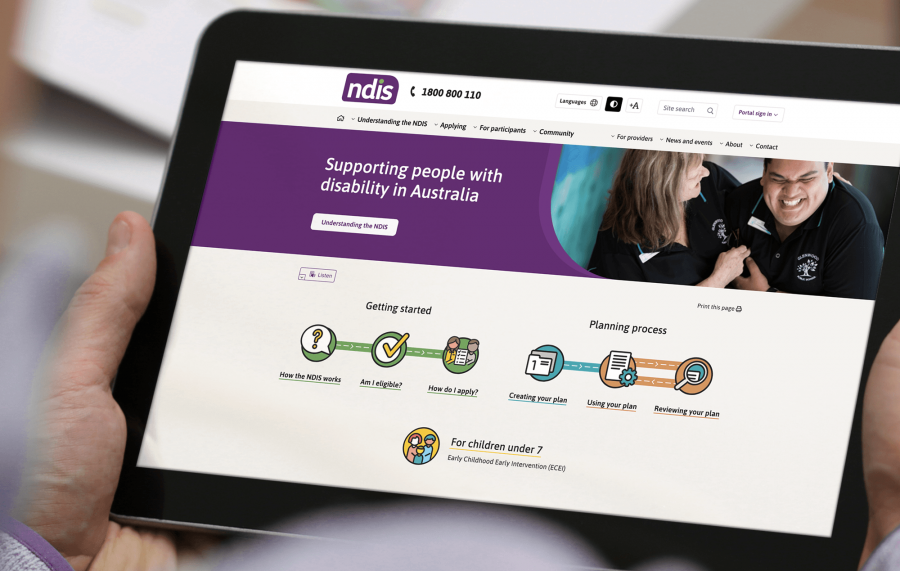Finding a job can be challenging for anyone, but for people with disabilities, NDIS disability employment involves overcoming unique obstacles. The are various NDIS disability employment pathways to help individuals with disabilities find suitable job opportunities. Thankfully, the National Disability Insurance Scheme (NDIS) in Australia provides people with disability with crucial support. This article explores how the NDIS enhances employment opportunities for people with disabilities and highlights the role of Re.Connect Support Services in facilitating this journey.
Understanding the NDIS
What is the NDIS?

The NDIS is an Australian Government initiative that supports Australians with permanent disability. Launched in 2013, the national disability insurance scheme transforms disability services by providing direct funding and individualised plans to eligible individuals, allowing them to choose and control the services they receive. This empowerment helps individuals access the supports social services they need to live independently and achieve personal goals, including employment.
Goals and Objectives
The NDIS aims to improve participants’ quality of life by offering tailored supports that cater to individual needs and goals. One primary objective is to facilitate employment opportunities, enabling people with disabilities to gain financial independence, develop new skills, and integrate into the community. By focusing on early intervention and capacity building, the NDIS helps participants build skills and confidence, leading to long-term positive outcomes like sustainable employment and greater community participation and better communication skills.
Benefits of Employment for People with Disabilities
Financial Independence

Having a job brings financial stability and independence, allowing individuals to manage their expenses and improve their quality of life. This independence fosters a sense of pride and accomplishment and opens doors to further opportunities, such as education and travel.
Social Inclusion and Mental Well-being
Employment promotes social inclusion and enhances mental well-being by providing opportunities to interact with colleagues, make new friends, and feel valued in the workplace. This reduces feelings of isolation and boosts confidence and self-esteem, contributing to overall happiness.
Skill Development and Career Growth
Work experience enables people to develop new skills and advance their careers. Employment fosters personal and professional growth through on-the-job training and professional development opportunities, helping individuals become more competitive in the job market. These opportunities enhance job readiness, making individuals more competitive in the job market.
NDIS Support Categories for Employment
Capacity Building Supports
These supports help NDIS participants build skills to achieve their employment goals, through employment services including training programs, career planning, and employment support. By investing in capacity building, the NDIS empowers participants to become more self-reliant and capable in the workplace. Additionally, workplace adjustments are made to ensure that participants can perform their job duties effectively.
Core Supports

Core supports assist people with disability daily activities and transport, helping participants access their workplace and manage daily routines effectively. This includes funding for personal, carers and transport, enabling participants to focus on their job responsibilities.
Capital Supports
Capital supports provide funding for assistive technology and home modifications, crucial for enabling people with disabilities to work efficiently and comfortably. These investments enhance participants’ ability to engage in employment leaving school and community activities.
Employment-Related Supports under NDIS
Finding and Keeping a Job

The NDIS provides specific funding for job coaching, resume building, and interview preparation through disability employment services, helping participants find and maintain employment. Employment consultants work closely with participants to identify suitable job opportunities and provide guidance throughout the job search process. Job coaches offer ongoing support to navigate workplace challenges and build positive relationships with colleagues.
School Leaver Employment Supports (SLES)
NDIS School Leaver Employment Supports (SLES) helps school leavers transition from school to work by providing career planning, work experience, and training programs. This support builds the skills and confidence needed for school leaver employment to enter the workforce successfully.
Supported Employment Services
Supported Employment Services, including Australian Disability Enterprises, offer ongoing disability employment services and support, to ensure individuals can sustain their employment. They include job coaching, mentoring, and workplace modifications, creating a supportive environment where employees with disabilities can thrive.
Role of NDIS Providers
How NDIS Providers Assist Participants
Registered NDIS providers, including Disability Employment Service (DES), help participants achieve their employment goals by offering job training, job placement, and ongoing support in the workplace. Providers develop personalised plans that address specific needs and aspirations, collaborating with employers to create inclusive workplaces.
Examples of Services Offered
NDIS service providers assist with job search, vocational training, job placement, and workplace modifications through Disability Employment Services (DES). They offer comprehensive services to help participants build fulfilling jobs, and sustainable careers.
Case Study: Re.Connect Support Services
Overview of Re.Connect Support Services
Re.Connect Support Services specialises in helping NDIS participants to find work and maintain employment through personalised support plans. Their holistic approach considers each participant’s strengths, interests, and challenges, developing customised strategies for success.
Their holistic approach has led to positive employment outcomes for many participants.
Success Stories
Re.Connect has helped numerous clients achieve their employment dreams. For example, Sarah, a participant with a passion for cooking, secured a job in a local café with Re.Connect’s support. She has since progressed to a supervisory role, mentoring new staff.
Unique Approaches and Methodologies

Re.Connect uses innovative approaches like mock interviews, workplace simulations, and personalised career development workshops. Their commitment to understanding each participant’s needs ensures a higher success rate in job placements.
Navigating the NDIS for Employment
How to Get Started with the NDIS
Contact the NDIS and complete an access request form. Once eligible, work with an NDIS planner to create a personalised plan. This process involves identifying supports and services relevant to your employment goals.
Creating an NDIS Plan Focused on Employment Goals
Your NDIS plan should outline your employment goals and the employment supports needed to achieve them, including training programs, assistive technology, and job coaching services. Regular plan reviews ensure it remains effective as you progress through transition and your career progresses.
Working with Your NDIS Planner
Collaborate closely with your NDIS planner or Personal/Family Support Provider to include all necessary supports in your plan. They help identify appropriate services and providers, ensuring your plan is responsive to your changing needs.
Skills and Training Programs Funded by NDIS
Available Training Programs
NDIS funds various training programs for skill development, from technical skills training to workshops on communication and teamwork. These programs enhance participants’ capabilities and employability.
Skill Development Workshops and Courses
Participants can enrol in workshops and courses to build specific job-related skills, such as resume writing and interview techniques. These opportunities prepare individuals for the workforce and improve their employability.
Role of Vocational Education and Training (VET)
VET programs offer practical skills and training in various industries, enhancing job readiness and career prospects for NDIS participants. These programs provide hands-on experience and industry-recognised qualifications, opening up various career pathways for NDIS participants.
Employer Incentives for Hiring People with Disabilities
Government Incentives and Grants
The Australian Government offers incentives and grants to employers who hire people with disabilities, including wage subsidies and funding for workplace modifications. These incentives encourage employers to create inclusive workplaces.
Benefits for Employers
Employers benefit from a diverse workforce, increased productivity, and enhanced company reputation. Inclusive workplaces bring fresh perspectives and innovative solutions, fostering a dynamic and innovative work environment.
Success Stories of Inclusive Workplaces
Many businesses have successfully integrated employees with disabilities, resulting in positive outcomes for both employees and organisations. Inclusive workplaces often see higher employee satisfaction and retention rates.
Overcoming Employment Barriers
Common Challenges Faced by People with Disabilities
People with disabilities encounter barriers like accessibility issues, discrimination, and lack of suitable job opportunities. Understanding these barriers is crucial to finding effective solutions and creating inclusive workplaces.
Strategies to Overcome These Barriers
Support networks, assistive technology, and workplace modifications are key to overcoming employment barriers. Education and awareness programs can also help reduce stigma and promote inclusivity.
Support Networks and Resources
Various organisations and community groups offer resources, information sessions and support to help people with disabilities navigate the employment landscape. These networks provide valuable guidance and assistance.
Importance of Workplace Accessibility
Designing Inclusive Workplaces
Creating an inclusive workplace involves making physical and cultural changes to accommodate employees with disabilities. This includes modifying workstations and ensuring accessible facilities.
Legal Requirements and Best Practices
Employers must adhere to legal requirements regarding disability and workplace accessibility. Implementing best practices in disability, such as providing assistive technology and flexible work arrangements, further supports employees with disabilities.
Technological Aids and Modifications
Technological aids, like screen readers and adaptive keyboards, enhance productivity for employees with disabilities, creating a more inclusive and efficient work environment.
NDIS Disability Employment and Entrepreneurship
Opportunities for Self-Employment
The NDIS supports participants who wish to start their own business, providing greater flexibility and control over their careers. Entrepreneurship can be an empowering way for individuals with disabilities to pursue their passions.
How NDIS Supports Entrepreneurial Ventures
NDIS funding can be used for business training, mentoring assistance, and purchasing necessary equipment, helping participants turn their entrepreneurial dreams into reality.
Examples of Successful Entrepreneurs with Disabilities
Many NDIS participants have launched successful businesses with the right support. For example, John, who has a visual impairment, started a successful online consultancy with extra support from NDIS funding for assistive technology and business training.
Financial Support and Funding Options
Funding Available Through the NDIS
NDIS provides various funding and service options to support disability employment service and-related goals, including training programs, assistive technology, and job coaching.
How to Apply for Financial Support
Work with your NDIS planner to include employment supports in your plan. The application process involves outlining your goals and the specific supports needed.
Managing Funds and Budgeting
Proper management of NDIS funds is crucial. Regularly review your fund spending and adjust plans as needed to maximise the benefits of your funding.
Networking and Community Engagement
Importance of Networking for Employment
Building a professional network can open doors to new job opportunities and provide valuable support and guidance. Networking events and community programs are great places to start.
Community Programs and Events
Various community programs and events connect job seekers with employers micro businesses and industry professionals, offering opportunities to gain insights and build relationships.
Building Professional Connections
Actively seek out networking opportunities, such as industry conferences and workshops, to connect with support people who can provide valuable guidance and assistance. Building strong professional connections can significantly enhance career prospects.
Future Trends in Employment for People with Disabilities
Technological Advancements
Advancements in technology create new job opportunities and make workplaces more accessible, transforming the employment landscape for people with disabilities. At Re.Connect, there is an accessible Disability Support Service that could help individuals with disability challenges.
Changing Workplace Dynamics
The workplace is evolving, with more emphasis on diversity and inclusion, creating a supportive environment for employees with disabilities.
Predictions for the Future
The future looks promising for employment opportunities for people with disabilities. With continued support from the NDIS and from registered NDIS provider and a focus on inclusivity, more people with disabilities will thrive in their careers, leading to a more diverse and dynamic workforce.


